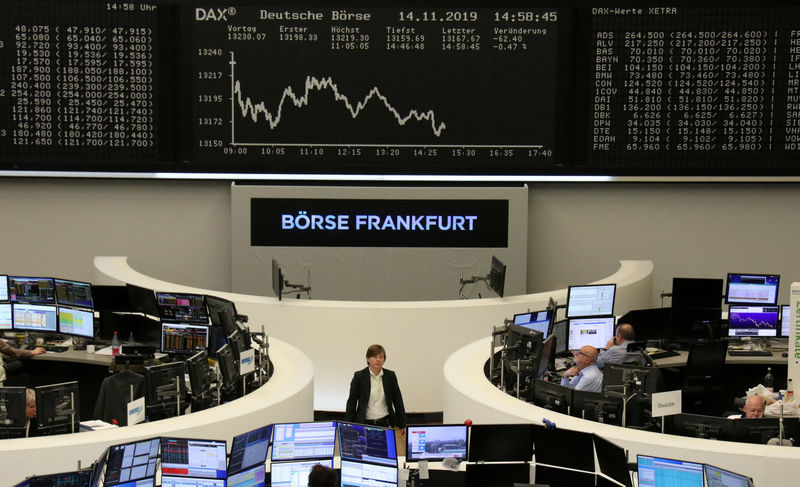By Thyagaraju Adinarayan
LONDON (Reuters) - Global stocks slid further on Thursday as the standoff between the world's two largest economies extended beyond trade, reducing the odds of a "phase-one" deal this year and forcing investors to seek shelter in safe-haven assets.
The U.S. House of Representatives on Wednesday passed two bills intended to support protesters in Hong Kong and send a warning to China about human rights.
With U.S. President Donald Trump seen likely to sign the bill, Deutsche Bank (DE:DBKGn) strategist Jim Reid said this "could risk progress towards a phase one trade deal".
European shares extended their losses from Wednesday with the pan-European STOXX 600 (STOXX) and the trade-sensitive Germany's DAX 30 (GDAXI) both sliding 0.7% to fresh two-week lows.
MSCI's broadest index of Asia-Pacific shares outside Japan (MIAPJ0000PUS) fell 1.1% to a near three-week lows, with Hong Kong's Hang Seng (HSI) tumbling 1.6% while Japan's Nikkei (N225) dropped 0.5%. Chinese mainland shares dropped 0.3% (SSEC).
U.S. S&P500 futures (ESc1) were down 0.2%, having dropped as much as 0.6% in Asian trade, a day after all three major indexes fell, with the S&P 500 (SPX) losing 0.4%.
"The cracks in equity market sentiment widened a little further yesterday, although this setback remains modest in the context of the index gains enjoyed so far in Q4," Ian Williams (NYSE:WMB), economics & strategy research analyst at Peel Hunt, said.
The S&P 500 (SPX) had hit a record high as recently as Tuesday on trade deal hopes, but Washington's move on Hong Kong derailed the rally.
Trade experts and people close to the White House said completion of a "phase one" U.S.-China trade deal could slide into next year, as Beijing presses for more extensive tariff rollbacks, and the Trump administration counters with demands of its own.
Chinese Vice Premier Liu He, also the chief trade negotiator, said he was "cautiously optimistic" on a phase one deal, according to a report by Bloomberg.
CAUTIOUS
As the chances of a deal in the near-term faded, investors sought the safety of government bonds, the yen and gold.
Spot gold
German government bond yields (DE10YT=RR) -- which move inversely to price -- steadied a day after hitting more than two week lows. The 10-year U.S. Treasuries yield dipped to 1.733% (US10YT=RR), near its lowest levels in three weeks.
On the other hand, the Chinese yuan hit three-week lows, trading as low as 7.0450 to the dollar
The dollar was soft against the yen at 108.59
"Our short-term strategy remains fairly cautious, as markets are very narrowly driven – every positive piece of news in trade negotiations sends markets higher, while any disappointment – sinks," Marija Veitmane, Senior Strategist at State Street (NYSE:STT) Global Markets said.
"This makes it very hard for investors to build positions in risk trades."
The euro gained slightly and was last trading at $1.1077 (EUR=) ahead of the release of the latest European Central Bank's policy meeting minutes.
Meanwhile, oil prices dipped, paring some of their 2% gains made on Wednesday after a better-than-expected U.S. crude inventories report and as Russia said it would continue its cooperation with OPEC to keep the market balanced.

Global benchmark Brent futures (LCOc1) dropped 0.5% to $62.08. U.S. West Texas Intermediate (WTI) crude futures (CLc1) were down 0.5% at $56.73 per barrel in early Thursday trade.